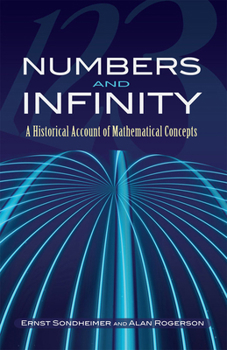Numbers and Infinity: A Historical Account of Mathematical Concepts
Select Format
Select Condition 
Book Overview
Perfect for either undergraduate mathematics or science history courses, this account presents a fresh and detailed reconstruction of the development of two mathematical fundamentals: numbers and infinity. One of the rare texts that offers a friendly and conversational tone, it avoids tedium and controversy while maintaining historical accuracy in defining its concepts' profound mathematical significance. The authors begin by discussing the representation of numbers, integers and types of numbers, and cubic equations. Additional topics include complex numbers, quaternions, and vectors; Greek notions of infinity; the 17th-century development of the calculus; the concept of functions; and transfinite numbers. The text concludes with an appendix on essay topics, a bibliography, and an index.
Format:Paperback
Language:English
ISBN:0486452980
ISBN13:9780486452982
Release Date:October 2006
Publisher:Dover Publications
Length:192 Pages
Weight:0.50 lbs.
Dimensions:0.4" x 5.6" x 8.5"
Customer Reviews
2 ratings
The unruly genie
Published by Thriftbooks.com User , 17 years ago
This is another book promising to whittle infinity down to size ... and succeeds about as well as possible. Overall it is a fairly good book. (Dover does not reprint bad books.) The authors state that the book is aimed at seniors in high school and university freshmen (though couched in British terminology). I think a very good high school student might master most of the book, especially if they have studied calculus. But probably much of the book is out of reach for most high school students. My own opinion is that the greatest appeal will be to those who have completed more advanced study of mathematics, and are looking to fill in some gaps ... or simply enjoy the book for recreational reading. The book divides roughly into three parts. Chapters 1 - 4 deal with the number concepts and representations of numbers. Chapters 5 - 7 deal with more abstract parts of algebra. The final chapters, 8 - 11, provide a historical overview of infinity. I will return to these chapters shortly. In my opinion some of the best parts of the book deal with topics other than infinity. These are: 1) an analysis of the del Ferro-Tartaglia-Cardano equation (chapter 5); 2) a discussion of some of the difficulties surmounted by Hamilton in extending the complex numbers to quaternions; and 3) Euler's evaluation of zeta(2) (pp. 128-129). Back to chapters 8 - 11. The Greeks discovered early on that "infinity" was a genie which made a most unruly servant. Sometimes it would lead you to the correct solution more rapidly than any other means. But just as often it would trip you up with some unsolvable conundrum. For these reasons the Greeks banned the infinity genie. But the mathematicians of the renaissance let the genie back out of the bottle. For better or worse, he (she?) has been with us ever since. For me the most interesting part of the story is the banishment on infinitesimals by Cauchy (ca. 1830) and his successors ... only to have them rehabilitated by Abraham Robinson in the 1960ies. As is generally known, after the banishment of infinitesimals the theoretical foundations of calculus were based upon the "limit concept." Now anybody who has ever taught calculus knows that students hate limits. They find them terribly artificial. Many mathematicians - secretly or openly - agree. So the question is: Can we expect that in the future infinitesimals will again form the foundation of calculus? Will new results be found as a result of this? (After all, most of the important results of calculus were discovered using infinitesimals.) Or will new paradoxes arise and send "non-standard analysis" (as it was termed by Robinson) back into the abyss? Unfortunately, the book offers no help in exploring these topics.
A nice historical treatment
Published by Thriftbooks.com User , 17 years ago
This book is a history of the number concept (with emphasis on the concept of infinity) from ancient days to nearly the present. If I have one complaint about it, it is that the book is very thin and could have said more on a few topics that I think are important; for example, the treatment of Robinson's "non-standard analysis" is very brief and would benefit by expansion. Still, it is an interesting read, and belongs in the library of anyone interested in the subject matter. Since much of the calculus depends on the concept of the infinite (and the infinitesimal) this book is particularly recommended for those interested in the origins of the calculus.






